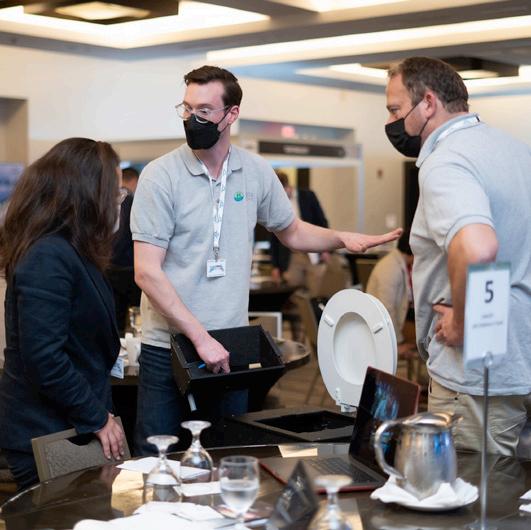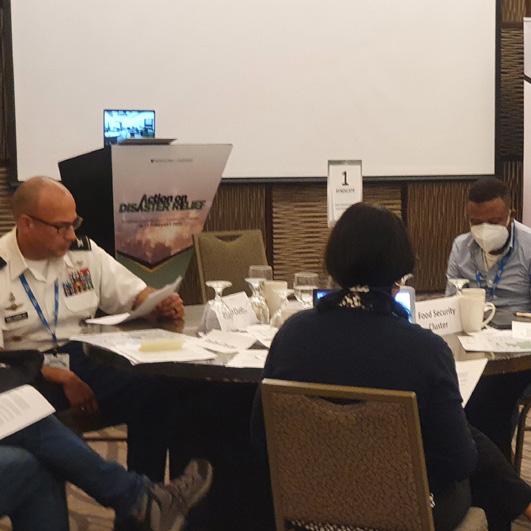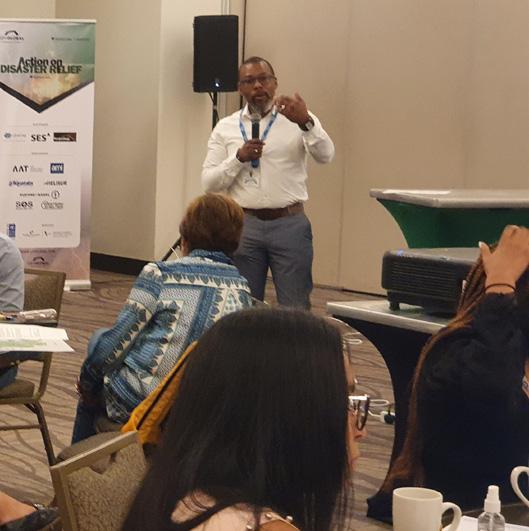
20 minute read
POST EVENT REPORT
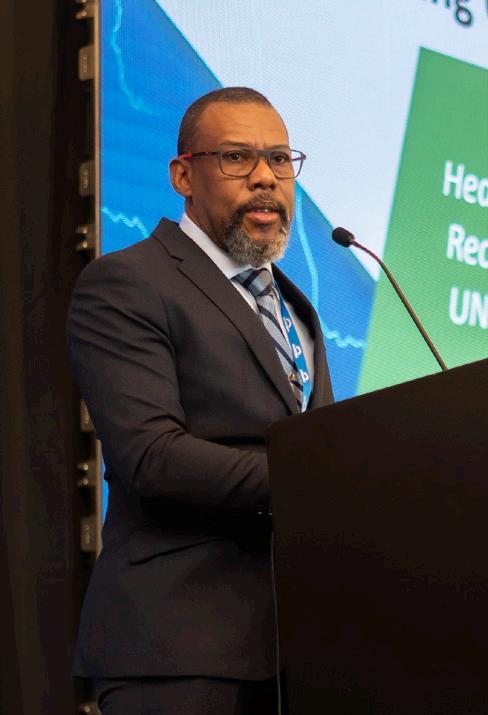

ADR2022 POST-EVENT REPORT
GRV Global was particularly delighted to return to the beautiful Panama City for the 7th anniversary Action on Disaster Relief (ADR2022) as our first in-person event in exactly two years, taking place between the 15th – 18th February, 2022. In our continued efforts to facilitate growing collaboration across the region, GRV Global welcomed almost 200 participants from Government, NGO stakeholders, International, UN and regional disaster agencies, for a busy few days of high-level plenary sessions, keynote speeches, workshops, private afternoon 1-2-1 matchmaking meetings, and networking functions, to devise a plan of action for future resilience across the Latin America and the Caribbean region.
PRE-EVENT: TUESDAY 15 FEBRUARY
ADR2022 Opening comments --- Opening Keynote Address
ADR2022 commenced with a Site Visit, supported by the Ministry of Government, to see the operational Regional Logistics Center for Humanitarian Assistance (CLRAH), the first and only “Humanitarian Hub” in the Americas. An initiative of the Government of Panama, created to support response operations of national systems and international organizations that specialize in humanitarian assistance, the Center was implemented by UNOPS (opened 2019) under the direction of the Ministry of Foreign Affairs and Ministry of Government, in coordination with UNHRD (operated by WFP), IFRC, and SINAPROC Panama who are the facility’s primary users. During the visit, delegates were given a brief presentation on the capacity and capabilities of the hub before being taken on a private tour of the stock & tailored emergency kits which are deployed for families, including: PPEs, masks, medicine kits, vaccines, tents, kitchenware, blankets, mattresses, education kits, and much more. Delegates also visited the UNHRD, IFRC, and SINAPROC warehouses and operations center situated at the Panamá Pacífico International Airport. Many returning delegates were able to appreciate the significant transformation from the bare structure seen during the ADR CLRAH visits in the past 5 years and were given the opportunity to question operational Heads of Department. ADR2022 speakers & sponsors were invited to a series of workshops beginning with a USAID Funding Workshop presented by Matthew Johnson, Industry Liaison & Communications Director of USAID - U.S. Agency for International Development. Participants learned how to work with USAID, about the Agency’s operations, key terminology, tips for submitting proposals, and funding opportunities. This session was followed by an OCHA Procurement Workshop on the United Nations Global Marketplace (UNGM) hosted by Rogerio Mobilia, Deputy Head of the Regional Office for Latin America & the Caribbean (ROLAC) at OCHA - UN Office for the Coordination of Humanitarian Affairs. Attendees were taken through initial steps to becoming registered and start using the UNGM platform; the self-financed inter-agency initiative is the official procurement portal of the United Nations System which brings together UN procurement staff and suppliers interested in doing business with UN agencies worldwide. The last workshop of the day was the IFRC Logistics Supplier Workshop led by Stefano Riera, Operational Procurement Manager Americas Office at IFRC - International Federation of Red Cross & Red Crescent Societies. Participants were given guidelines on how to become a supplier for the IFRC, what they procure and contract etc. The workshop also included a presentation of IFRC’s Regional Logistics Units, their online item catalogue, who is purchasing, and the process to become a registered supplier including how to obtain tender documents.
ADR2022 Concluding ADR2022’s pre-event day, delegates were able to unwind, network, and discuss the two days ahead at BETWEEN HUMANITARIAN AID AND STAKEHOLDERS, THE BRIDGES WE HOLD our Evening Networking Reception, enjoying drinks and canapes at the Wyndham Albrook Mall Hotel Lobby Bar. The informal gathering also provided a prime opportunity for panelists to engage with their session Chairs ahead of the AMONGST EACH OTHER main two days of plenary conference sessions.
MAKES US STRONGER
DAY 1: WEDNESDAY 16 FEBRUARY
ADR2022 delegates commenced day one with networking tea and coffee whilst remaining participants registered for their welcome packs, before heading into the Colon Room for the Opening Ceremony. GRV Global CEO, Andrew Dowell, was thrilled to greet to all participants to GRV’s first live in-person event in exactly two years, welcoming familiar and new faces to the event. Andrew praised the progress and great work taking place at the Regional Logistics Center for Humanitarian Assistance (CLRAH) - the pivotal role they have played in coordinating, rapid and effective disaster response
and in facilitating a means for collaboration. In closing, Andrew encouraged all delegates to continue the momentum built in previous years of ADR; to tackle the key issues around preparedness, risk reduction, disaster relief and recovery but also setting the foundations to create a long-lasting partnerships among public and private sector leaders. Next to take to the stage was Conference Chair, Ronald H. Jackson, Head of the Disaster Risk Reduction & Recovery Team (DRT) for Building Resilience at UNDP. Ronald offered everyone a warm welcome, having previously Chaired ADR2020, before remarking about the significance of dialogue and advancing new ways of collaborating and working together with different actors from the public and private sector. Ahead of the first panel session, was an Opening Keynote Address by H.E. Janaina Tewaney Mencomo, the Republic of Panama’s Minister of Government, who also welcomed all ADR2022 delegates. H.E Janaina Tewaney Mencomo began by commenting on the effective humanitarian practices in Latin America and the Caribbean. The Minister emphasized on the importance of continued contributions to humanitarian resilience and ensuring that vulnerable communities receive humanitarian assistance through logistics and effective action. She mentioned Action on Disaster Relief as a critical event which every year, forms important in-person alliances between key experts on disaster relief management, humanitarian assistance and aid amongst other topics. She also noted that the Government of Panama is proud and thankful to the humanitarian community and stakeholders’ part of ADR to achieve safer disaster response. H.E Janaina Tewaney Mencomo closed her address on behalf of his excellency President of the Republic Panama, wishing all delegates the greatest of all success for ADR2022. The first discussion panel of ADR2022 explored
Preparedness; focusing on Disaster Risk Governance
and was Chaired by Jorge Ortiz, Director of Sales - Latin America & the Caribbean of Western Shelter Systems, a Bronze Event Sponsor. Panel 1 discussed the various ways of improving response before a disaster strikes, stressing on the prominence of creating a local network and activating clusters. They highlighted the role of communities at the local level and civil society in preparedness, alongside national assistance. Communities need to be organized and prepared at the family level to build capacity in response, thus reducing the amount of risk created every day. Panelists also noted the role of civil society response as representing the voice of the population and identifying local stakeholders in a cohesive approach by working with women, indigenous women, youth, disabled etc. Finally, panelists underscored the importance in communicating and understanding the communities’ needs through

ADR2022 perception assessment to explain the reality, understand risks and vulnerabilities, and improving their knowledge to strengthen their resilience in disaster risk reduction.
WOMEN ARE
DISPROPORTIONALLY Following a short Networking Tea & Coffee Break came
AFFECTED BY Panel 2 Resilience; focusing on Integration of the
DISASTERS; WE MUST LEARN FROM THIS Private Sector into the Disaster Cycle Chaired by Shelley Cheatham, Head of the Regional Office for Latin America & the Caribbean (ROLAC) of OCHA - UN Office for the Coordination of Humanitarian Affairs. Shelley introduced the panel by providing an overview on OCHA’s role as “connector of the dots” – working with partners to assist Governments in mobilizing international assistance and by bringing together humanitarian actors to ensure a coherent response to emergencies. Panelists spoke about bridging the gap between local and international agencies to streamline disaster responses, for example by engaging the community and understanding their needs. Others mentioned the organization aspect of preparedness, with the gap in delivery and logistics as seen during the earthquake in Haiti and the struggles working with the local government, organizations, and various rescue teams. Moreover, responsibility must be shared between public and private sector, i.e. response of public sector needs to be administered by the private sector. The private sector must also be brought into the cycle for effective coordination. Conference Chair, Mr. Ronald Jackson, briefly intervened stating that the greater challenge is balancing speed and agility, and accountability requirements. Returning from Panel 2, next on the agenda was a Keynote Address from Claudia Herrera, Executive Secretary of CEPREDENAC - Coordination Center for the Prevention of Natural Disasters in Central America. Claudia sentiments echoed her intervention in Panel 2 emphasizing the need to take an intersectoral approach linking private and public institutions, defining actions, and identifying threats to pave a regional strategic agenda and pathway.
ADR2022 Closing the first day of panel discussions was Panel 3:
Technology; focusing on Climate-Efficient Disaster
FIRST RESPONDERS ARE THE LOCAL PEOPLE Response chaired by Barry Koperberg, General Manager of Wings For Aid. The session centered on integrating modern technology, information knowledge, and data in disaster planning. Panelists spoke about data access to empower local communities to be better prepared for disaster and build
ADR2022
“WHETHER IT IS
AN EARTHQUAKE, A
CYCLONE, A FLOOD OR ANY OTHER EVENT, THE
HEALTH SECTOR WILL
ALWAYS BE AMONG THE TOP PRIORITY SECTORS. AS A RESULT,
IT MUST ALWAYS BE
PREPARED TO DEAL
WITH EXCEPTIONAL
HEALTH SITUATIONS”
“RESPONSIBILITIES NEED TO BE CLEAR FROM
BEGINNING AND IN
ADVANCE, BEFORE AN EMERGENCY HAPPENS”
“BRINGING CAPACITY
AT THE LOCAL LEVEL IS
KEY IN RESPONSE”
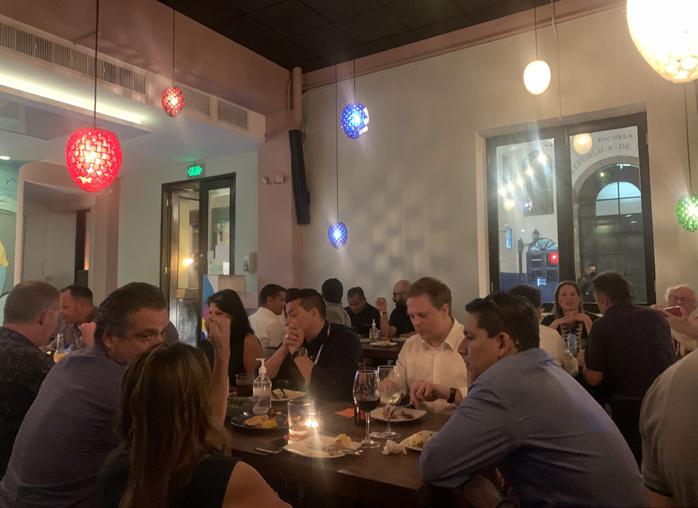

ADR2022 POST-EVENT REPORT
ADR2022
“RESPONSIBILITIES NEED TO BE SHARED. THE RESPONSE OF PUBLIC SECTOR NEEDS TO BE ADMINISTERED BY PRIVATE SECTOR”
“WE NEED TO WORK TOGETHER WITH INTERNATIONAL AGENCIES, UNDERSTAND EACH OTHER’S CULTURE, KNOW WHAT PEOPLE HAVE AND DON’T HAVE, AND WHAT TO TAKE AND NOT TAKE IN ORDER TO STREAMLINE DISASTER RESPONSE”
“WORKING WITH LOCAL GOVERNMENTS, ORGANIZATIONS, AND DIFFERENT RESCUE TEAMS THAT COME WITH DIFFERENT EQUIPMENT CAN BE CHALLENGING BUT WE WERE ABLE TO ACT AND MOVE VERY QUICKLY”
“WE ARE PROMOTING GENERATION OF NEW GENERATION OF RISK; WE NEED TO HAVE ALL ELEMENTS THAT CHARACTERIZE RISK TO DEVELOP CONTINGENCY PLANS WHICH IS THE ONLY WAY TO MINIMIZE IMPACTS”
resilience and to feel safeguarded during complex situations and disasters emergencies. However, it is critical that the data information uses simplified language as technology often provides the people with complex technical terminology. A panelist provided the example of SINAPROC which has developed data tools/software through geo-referencing at the local level so communities can understand and analyze the data and take decisions on whether to prepare and/or move. Panelists also mentioned how the intervention needs to be sensitive to the risks already present and the meaning of supporting one another beyond the humanitarian sector through various organizations, academic institutions, and the private sector to ensure resources go to those most in need. After an informative day of discussions, delegates enjoyed a delightful Networking Lunch Break, continuing discussions ahead of the afternoon 1-2-1 Disaster Relief Matchmaking Meetings. In the weeks leading up to the event, delegates were able to identify their preferred matchmaking meetings, through GRV Global’s secure scheduling website. Preevent, meeting schedules were finalized and confirmed to all participants to maximize potential outcomes of our personable format of 20-minute matchmaking meetings. Wednesday afternoon featured hundreds of one-to-one meetings with many organizations taking back to- back appointments throughout. Participants were quick to identify their value and praise their efficiency. GRV Global also wanted to ensure all ADR2022 delegates had the opportunity to take in the beautiful Panama City which included an Event Dinner at the Tántalo Kitchen in the picturesque Casco Viejo (Old Town). Participants were welcomed by a panoramic roof-top view of the city, a stunning location to relax in and continue their conversations from earlier in the day whilst enjoying tapas food with a Panamanian twist.
DAY 2: THURSDAY 17 FEBRUARY
After a pleasant evening in Casco Viejo, ADR2022 delegates enjoyed networking tea and coffee before returning to the Colon Room, for a warm welcome from Conference Chair, Ronald Jackson - providing a brief overview of the stimulating and challenging discussions from day one, and a look at the discussion topics ahead. Without further ado, it was time to begin with the first Keynote Address of the day. Carlos Uribe, Regional Programme Officer of UNDRR - UN Office for Disaster Risk Reduction gave an informative address entitled Systemic Risk and Participation of the Private Sector in a Strengthened DRR Governance. Carlos began his presentation by mentioning that the Latin America and Caribbean exposure to issues of climate change, conflicts, and migration flow, is accelerating the effects of disasters. Carlos echoed previous sentiment from day one’s panels stressing on the need to get down at the local level, as this is where risk is manifested and the need to integrate practices through contingency evacuation plans. He also underlined the role of the private sector since service companies can have effective action within disaster risk reduction and planning. For example, he cited ARISE – the Private Sector Alliance for Disaster Resilient Societies, a network of private sector entities led by UNDRR which mobilizes and facilitates the private sector to carry out riskinformed investments and apply business practices that reduce and prevent risk, build resilience, and enhance recovery from disasters. Carlos closed his address by stressing on the need for systematic governance adapted to action which can be effectively carried out. ADR2022
“WE NEED TO INTEGRATE MORE KNOWLEDGE IN DISASTER PLANNING. INTERVENTION NEEDS TO BE SENSITIVE TO THE RISKS THAT WE ALREADY HAVE” “WE MUST TRAIN POPULATION ON THE USE OF DATA. THEY NEED TO TRAIN ON WHAT TO DO BEFORE EMERGENCY RESPONSE TEAM APPEARS” “IT IS IMPORTANT FOR THE COMMUNITIES TO FEEL SAFEGUARDED DURING COMPLEX SITUATIONS AND DISASTERS EMERGENCIES”
The first panel discussion of the day began with Panel
4: Health; focusing on Lessons from the Impact of COVID-19 on the Disaster
Management Cycle led by Jorge E. Zequeira, Regional Civil Military & Security Coordinator of IFRC - International Federation of Red Cross & Red Crescent Societies. Panelists began the discussion by noting the economic impact on vulnerable countries caused by the COVID-19 pandemic. COVID- 19 also highlighted the long-term inequalities around the globe and the impact on communities’ livelihoods. Panelists discussed how the pandemic resulted in delays in delivery and in cost for humanitarian operators due to lack of customs and procedures, calling for an international legal framework, and the need to document Standard Operating Procedures (SOPs). Panelists also noted importance in engaging with national and local governments to understand the concerns of all parties when a disaster occurs. From a military perspective, they mentioned the struggle managing to get the required assistance (due to limited contract accessibility) despite competing against global requirements for PPE and ventilators and coordinating with agencies like USAID. Finally, speakers also highlighted how the main challenge lies in providing a cohesive response from all sectors in a crosscutting manner and the need to unify information for example by establishing a unified command center, protect healthcare workers, and respond to people who require national aid. Panel 4 was followed by a Spotlight Address from Gery Warner, Owner & CEO and Suzanne Warner, Sales Goddess of Tentnology, Silver Event Sponsors. They provided an overview of Tentnology as a service provider of rapid deployment and instant function of portable emergency shelters which are quick, effective, and reliable shade structures and disaster relief housing. The founders spoke about the tents features which include Compact packaging, Easy to build, Weather resistant, and Customized emergency shelter solutions. Delegates enjoyed a brief Networking Tea and Coffee Break before returning for the penultimate session, Panel
5: Communications; focusing on its Role in Disaster
Planning & Preparedness Chaired by Guillermo Coronado, Senior Sales Director - Mexico & Central America of SES Americom, Inc. Silver Event Sponsors. Panelists underscored the use of communications solutions during emergencies to improve preparedness, capacity-building to develop local capabilities and increase resilience of local first responders. It was noted that the community and individuals’ needs are often overlooked when it comes to establishing community networks. Panelist stressed that it is crucial to think of offline and open-source solutions during an emergency. Assessment’s need be done with no dependency on networks as satellite solutions are often expensive and not accessible to everyone. In addition, panelists also highlighted the importance of training the community in crisis and disaster management in a reasonable manner as often the lowest incomes groups affected by disasters are unable to affordable hands-on training.
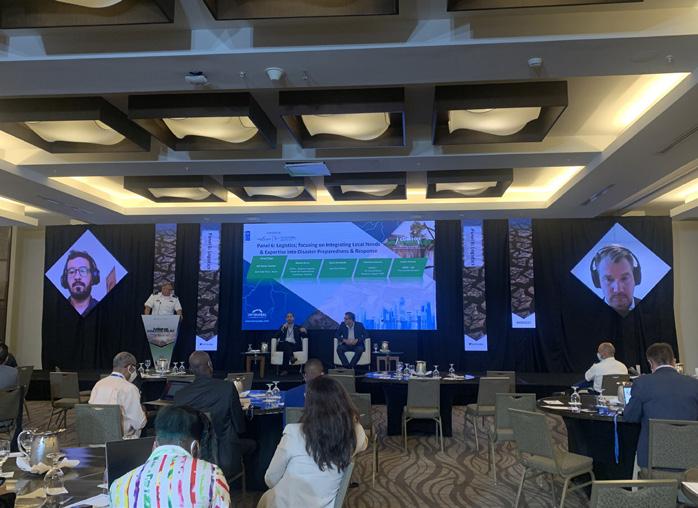
ADR2022
WE NEED TO GET DOWN TO LOCAL LEVEL.
THIS IS WHERE RISK
IS MOST MANIFESTED ALONG WITH ITS DIRECT IMPACT
After an active 3 days of discussions, networking, and meetings, it was left to COL Steven Gventer, Commander of the Joint Task Force-Bravo returning to the stage as Chair of
Panel 6: Logistics; focusing on Integrating Local Needs
& Expertise into Disaster Preparedness & Response. Panelists underlined the need for secure, efficient, and reliable logistics solutions, not only regionally but globally as highlighted by COVID-19 pandemic. They spoke about moving humanitarian actors, supplies and aid which present many coordination challenges and the need to have better understanding of the far-reaching potential, intent, and methodology of responders. Given the current disruption in the supply chain, panelists underscored the need to share information not just between the public and private sector also between the UN agencies to assess what is available in terms of stocks, suppliers, strategies to cope with the challenges. From a UN perspective, panelist emphasized the important partnership with the private sector during the crisis by working with freight forwarders to consolidate the shipping

ADR2022 Day 2: Panel 6
ADR2022
“US SOUTHCOM DID MORE THAN A SUFFICIENT JOB TO GET THE NECESSARY ASSISTANCE REQUIRED DURING THE COVID-19 PANDEMIC”
“IT IS CRITICAL TO ENGAGE WITH NATIONAL AND LOCAL GOVERNMENTS”
“COVID 19 MADE IT CLEAR OF INEQUALITIES THAT ARE LONG TERM AROUND THE WORLD. THIS HAD A HUGE LONG TERM IMPACT ON THE LIVES OF THE COMMUNITY”
“IT IS IMPORTANT TO MITIGATE ASPECTS OF PANDEMIC”
“IT IS IMPORTANT TO WORK WITH CUSTOM ADMINISTRATION AND CROSS BROADER AGENCIES TO PREPARE PROTOCOL AS WELL AS TO WORK WITH HUMANITARIAN PARTNERS, SO THEY HAVE BETTER UNDERSTANDING OF ROLE OF CUSTOMS”

ADR2022 POST-EVENT REPORT
ADR2022
“SATELLITE COMMUNICATIONS ALONG WITH FIRST DISASTER RESPONDERS AND NGOS ARE ON THE FRONTLINE OF AGENCIES. HOWEVER, THERE IS NOT ENOUGH ATTENTION PAID ON THE COMMUNITY NEEDS AND INDIVIDUALS AFFECTED BY DISASTER. WE MUST RE-ESTABLISH THOSE COMMUNICATION NETWORKS”
“WE MUST THINK OF OFFLINE SOLUTIONS. HOW CAN WE DIGITIZE SOFTWARE’S AND COMMUNICATIONS TO ALLOW ASSESSMENTS TO BE DONE WITHOUT DEPENDENCE ON NETWORKS?”
“LOCAL COMPANIES ARE LOOKING TO IMPROVE ABILITY TO STAY CONNECTED NOT ONLY JUST FOR US AS MILITARY BUT ALSO FOR CITIZENS WHO RELY ON COMMUNICATIONS”
vaccines from their warehouses. Finally, they noted the need to establish sub-regional logistics hubs and for a permanent regional strategic movement coordination hub. The closing of Day 2 of the 7th annual Action on Disaster Relief forum was signified by the final words of Conference Chair, Mr. Ronald Jackson, whom, after several comprehensive and thought-provoking panels and Keynote Addresses, only had left to say a big thank you to all the participants for their commitment and willingness to challenge their ideas and form a better understanding of disaster relief and preventative measures in a collaborative manner. He further expressed his gratitude to the Panamanian Government for their support and continued efforts towards resilience in the region. Finally, CEO of GRV Global, Andrew Dowell shared his sincere appreciation with all the speakers and panelists for their presentations and dialogue, and for their time and commitment to the 1-2-1 matchmaking afternoon meetings. Additionally, he expressed his thanks to the local Panamanian suppliers for all event materials, the excellent simultaneous translation work, and the event Sponsors for their investment in making yet another great event worthwhile. To conclude, all participants were encouraged to continue the discussions and new-found partnerships beyond the forum, to bring forth the change suggested throughout the event and hopefully return next year with great news of the progress of their collaborations. To the sound of applause, delegates headed for a Networking Lunch Break before the final afternoon of 1-2-1 matchmaking sessions. Once again, GRV Global’s structured public-private meetings format was held in high regard, with more than 400 hundred meetings being held across the two days.
POST-EVENT: FRIDAY 18 FEBRUARY
The 7th annual Action on Disaster Relief forum ended with a hands-on Disaster Simulation Exercise & Inter-Agency Workshop. Utilising the NEST (Network Enables Simulation Tool) software from Bournemouth University’s (UK) Richard Gordon, and prepared by Lt Col Anton Gash (Retd.), ADR Thematic Adviser & Former UK Defence Attache to the Caribbean, he, ADR2022’s Conference Chair, Ronald Jackson of UNDP, and Rogerio Mobilia, OCHA’s Deputy Head of Regional Office for Latin America & the Caribbean (ROLAC), co-facilitated this important gathering for the first time at a GRV Global event. Regional disaster stakeholders convened alongside select event sponsors for a scenario-based simulation, working in syndicates of six, to form a fictional Crisis Management Team. Each group managed an inbox of alerts, generating a cascade of challenges, questions and tasks relating to a natural disaster. The simulation was paused at certain points to promote group discussion and shared observations. More details on the Simulation Workshop can be found later in this Report. Sadly, it was almost time for participants to say their goodbyes and prepare to head home however, with a newfound resolve to tackle some of the region’s biggest challenges and the knowledge of a dependable humanitarian hub, we look forward to the implementations ahead based on what we had learned… Until next year, we look forward to the advancements made across this vital sector, and to continuing the discussions and collaborations made for the region! n
ADR2022
“WE MUST BE ABLE TO SHARE INFORMATION AMONG OURSELVES, NOT JUST BETWEEN INTERNATIONAL ORGANIZATIONS, NONGOVERNMENTAL ORGANIZATIONS, GOVERNMENT, AND THE PRIVATE SECTOR BUT ALSO BETWEEN THE UN AGENCIES IN ORDER TO ASSESS WHAT IS AVAILABLE IN TERMS OF STOCKS, SUPPLIERS, STRATEGIES, TO COPE WITH THE CHALLENGES”
“IT IS IMPORTANT TO DISCUSS A NUMBER OF MITIGATION MEASURES TO ENSURE SPEEDY DELIVERY AND RELIABILITY OF GOODS”
“THE TIME TO GET SOMETHING TO THE POINT OF IMPACT AND EMERGENCY IS VITAL IN THE BEGINNING. IF IT IS LOCAL, IT WILL BE THERE MUCH FASTER”
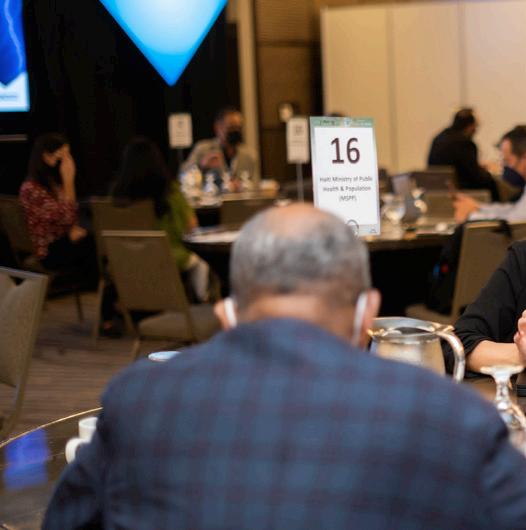
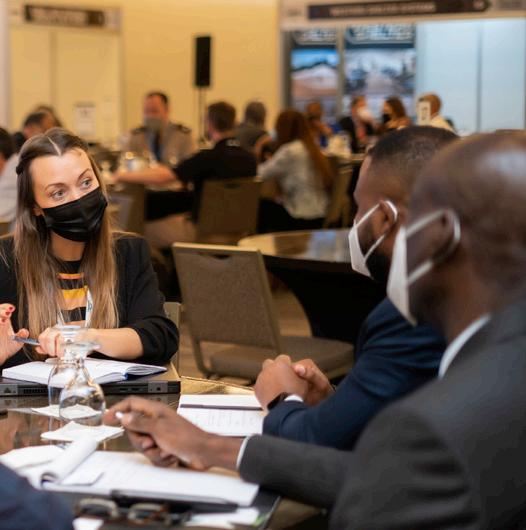
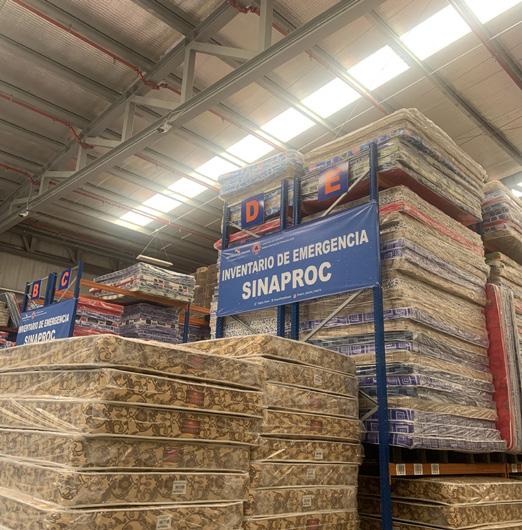
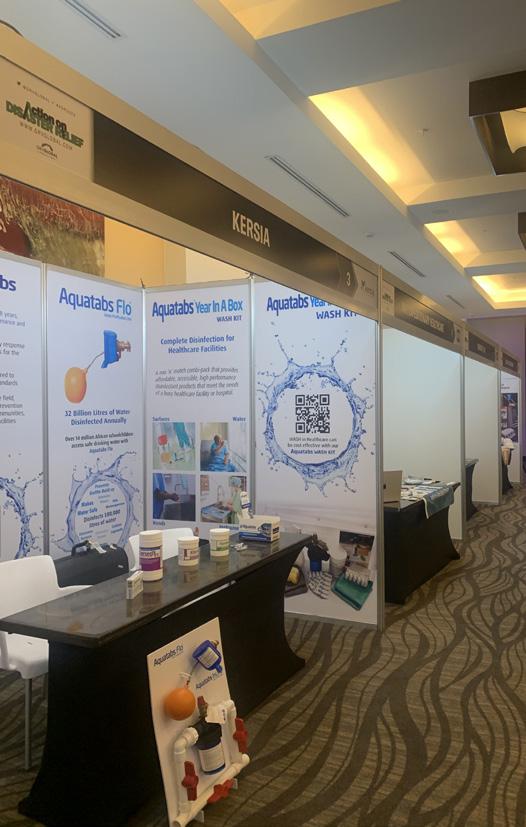
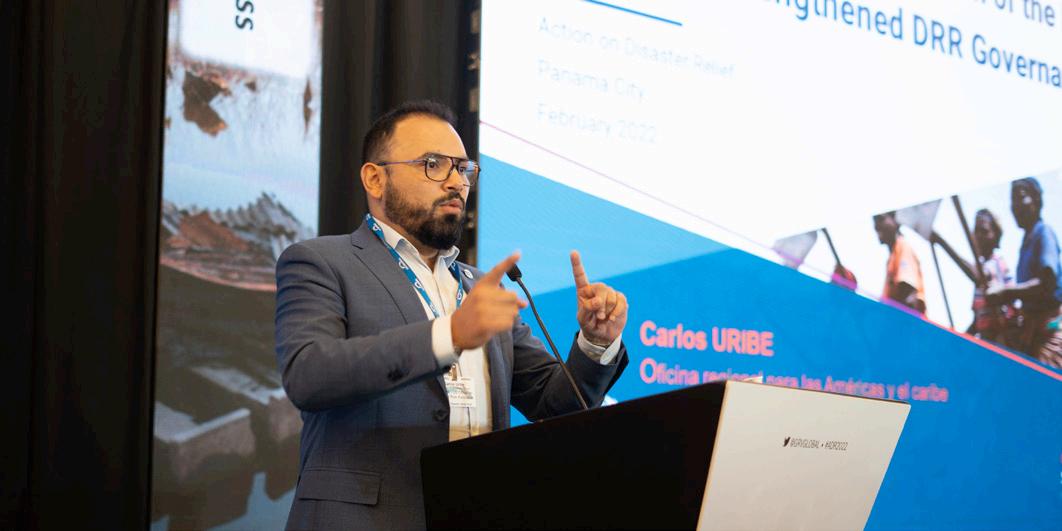

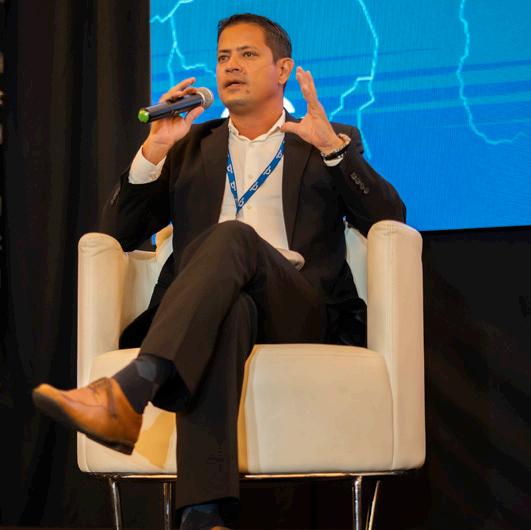
KEISHA LINTON, REGIONAL SECURITY SYSTEM (RSS) This was one of the best administered conferences I have been to. Thanks for organizing such an event as it was eye-opening listening to other experts in the field that I am not usually able to work with. Furthermore, the simulation was loads of fun and a learning experience at the same time!
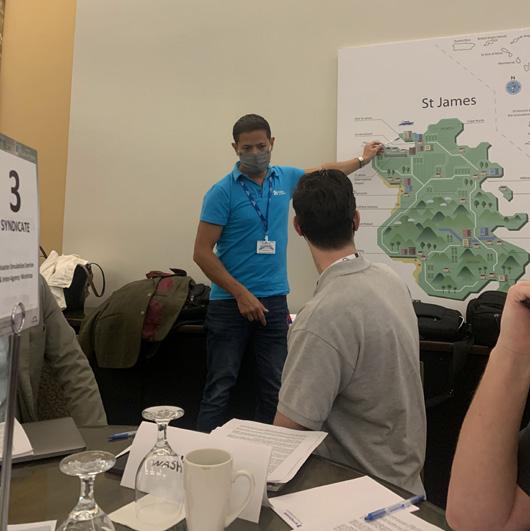
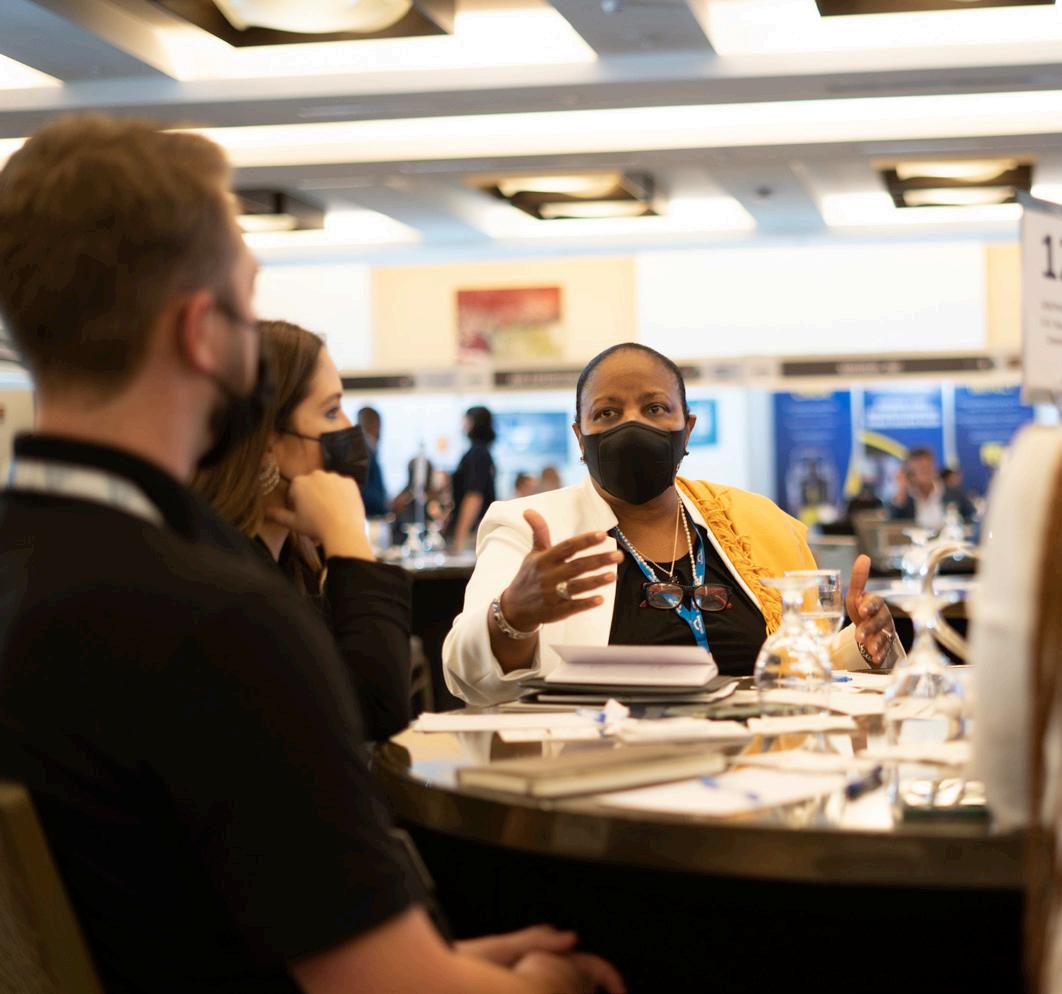

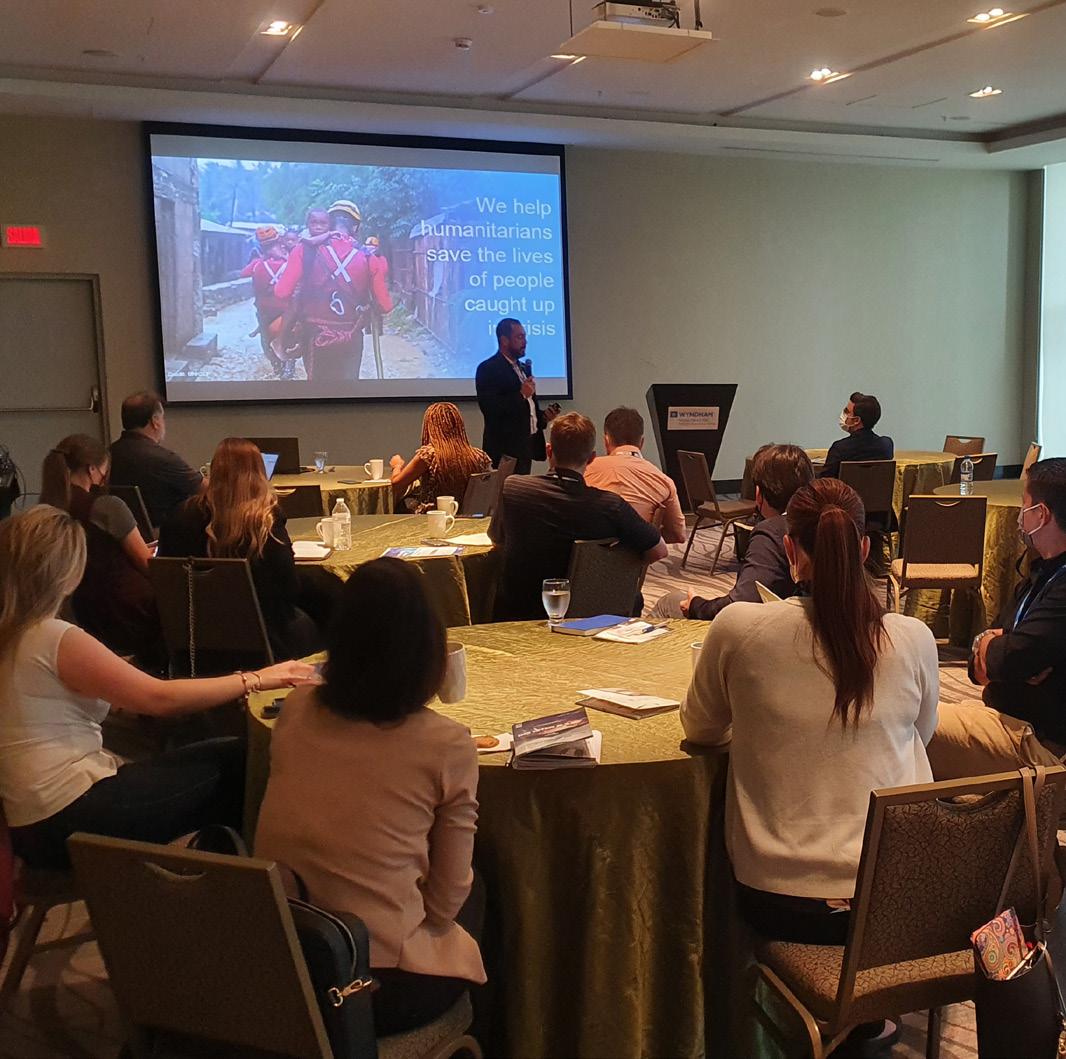
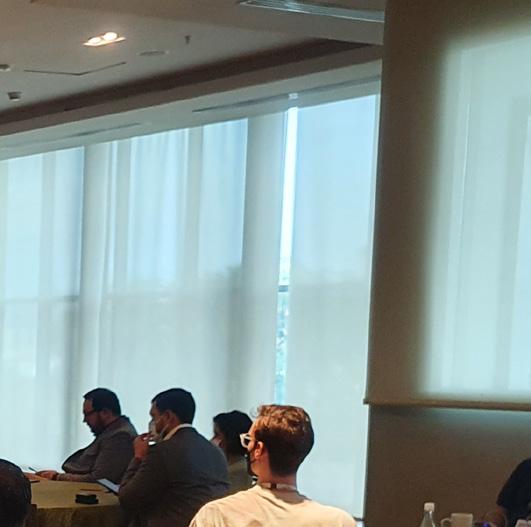
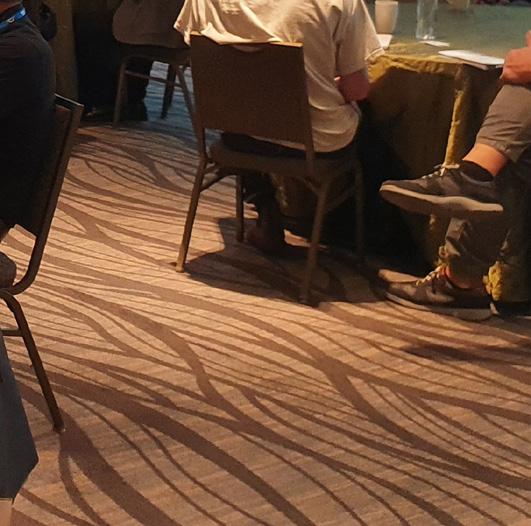
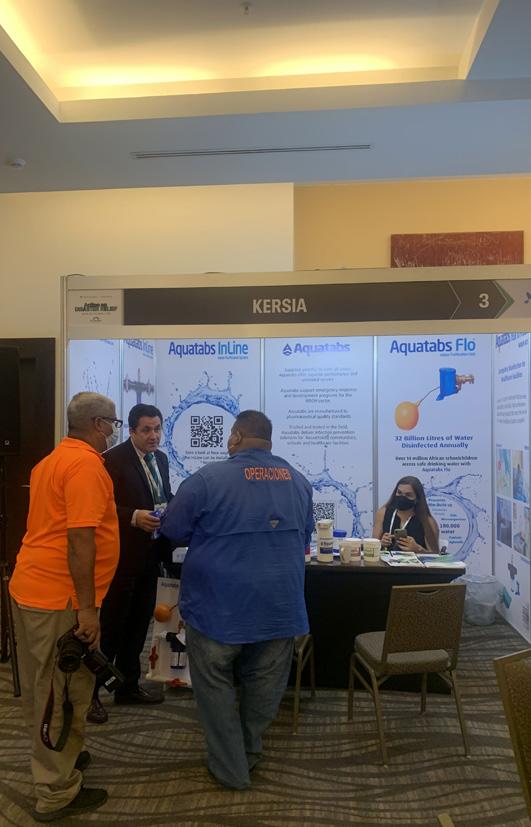
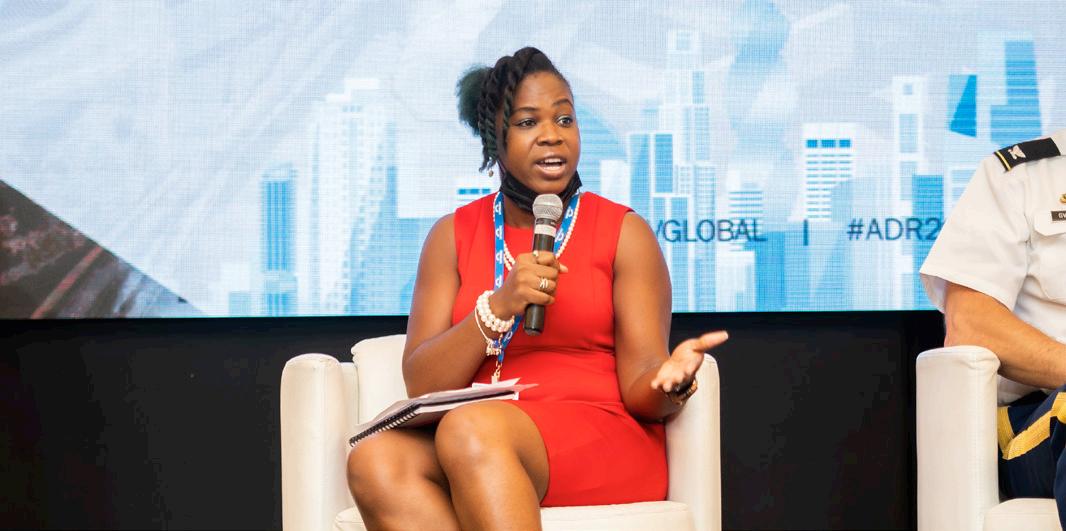
BRUM CERZOSIMO, ULTISAT Good to be back to in-person setup. Nice venue, good food, good meeting space, ease access to support, and good care about covid needs inc. local testing.
